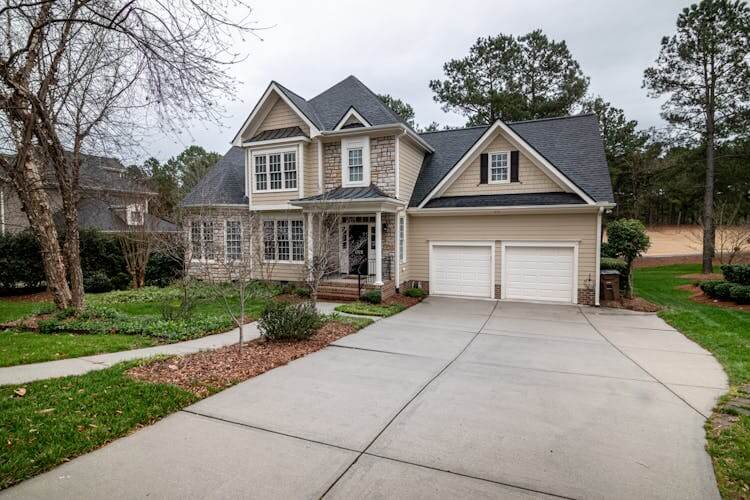When it comes to buying a home, understanding the ins and outs of mortgage insurance is crucial. Mortgage insurance is a financial tool that protects lenders in case borrowers default on their home loans. It is typically required for borrowers who put down less than 20% of the home’s purchase price as a down payment.
Mortgage insurance comes in the form of a mortgage insurance premium, which is an additional cost added to your monthly mortgage payment. This premium is calculated based on factors such as the loan amount, loan-to-value ratio (LTV), and the type of mortgage insurance you have.
By having mortgage insurance, lenders can offer loans to borrowers who may not have a substantial down payment, making homeownership more accessible. However, it’s important to understand how mortgage insurance works and the different types available to make informed decisions about your home loan.
Key Takeaways:
- Mortgage insurance is a financial tool that protects lenders in case borrowers default on their home loans.
- It is typically required for borrowers who put down less than 20% of the home’s purchase price as a down payment.
- Mortgage insurance comes in the form of a mortgage insurance premium, which is an additional cost added to your monthly mortgage payment.
- The premium is calculated based on factors such as the loan amount, loan-to-value ratio (LTV), and the type of mortgage insurance you have.
- Mortgage insurance makes homeownership more accessible by allowing lenders to offer loans with lower down payment requirements.
Why is mortgage insurance necessary?
Understanding the need for mortgage insurance is crucial when obtaining a home loan. It plays a vital role in protecting lenders in case of borrower default, ensuring their financial security. Mortgage insurance serves as a safeguard for lenders, providing them with a safety net in the event of unforeseen circumstances.
When you apply for a home loan, mortgage insurance becomes necessary in specific situations. Typically, mortgage insurance is required when homebuyers have a down payment of less than 20% of the home’s purchase price. In such cases, the mortgage insurance protects the lender in the event of default, compensating for the higher risk associated with lower down payments.
Moreover, mortgage insurance enables borrowers to qualify for home loans they might not otherwise be eligible for. By reducing the level of risk for lenders, mortgage insurance opens up opportunities for buyers who have limited funds for a down payment. This accessibility to home loans expands housing opportunities for a broader range of prospective homeowners.
The Factors That Determine the Necessity of Mortgage Insurance
Several factors influence when mortgage insurance becomes necessary for different types of loans. These factors may include the type of mortgage loan, such as conventional, Federal Housing Administration (FHA), or Department of Veterans Affairs (VA) loans. Additionally, the borrower’s creditworthiness, loan-to-value ratio (LTV), and financial profile might impact the requirement for mortgage insurance.
Overall, the necessity of mortgage insurance arises to mitigate risks and secure the financial stability of lenders. By understanding the purpose and importance of mortgage insurance, you can make informed decisions when applying for a home loan, ensuring a smooth and secure borrowing experience.
Types of mortgage insurance
Mortgage insurance is a critical component of the loan process, providing protection for both lenders and borrowers. It comes in various forms depending on the loan type and specific circumstances. Understanding the different types of mortgage insurance can help you make informed decisions when obtaining a home loan.
Private Mortgage Insurance (PMI)
Private mortgage insurance, or PMI, is a type of mortgage insurance that applies to conventional loans. It is typically required when borrowers make a down payment of less than 20% of the home’s purchase price. PMI protects lenders in case of default and enables borrowers to secure financing with a lower down payment.
Federal Housing Administration (FHA) Mortgage Insurance
The Federal Housing Administration (FHA) provides mortgage insurance for loans offered by FHA-approved lenders. This type of mortgage insurance allows borrowers to qualify for home loans with lower down payments and more lenient credit requirements. FHA mortgage insurance protects lenders against losses in the event of borrower default.
Department of Veterans Affairs (VA) Mortgage Insurance
The Department of Veterans Affairs (VA) offers mortgage insurance as part of its VA loan program. VA mortgage insurance is available exclusively to eligible veterans, active-duty service members, and surviving spouses. It provides protection to lenders and enables qualified individuals to obtain favorable loan terms and financing options.
Understanding the different types of mortgage insurance can help you navigate the loan process and choose the most appropriate option for your specific circumstances. Whether it’s private mortgage insurance, FHA mortgage insurance, or VA mortgage insurance, each type serves a vital purpose in facilitating homeownership and providing financial security.
How is mortgage insurance calculated?
Calculating mortgage insurance involves considering several factors to determine the premium amount. By understanding the intricacies of the calculation process, you can gain insight into the cost and implications of mortgage insurance.
Loan-to-Value Ratio (LTV)
The loan-to-value ratio (LTV) is a critical factor in determining mortgage insurance costs. It is calculated by dividing the loan amount by the appraised value of the property. A higher LTV ratio implies a higher risk for the lender, resulting in higher mortgage insurance premiums.
Duration of Mortgage Insurance
The duration of mortgage insurance also influences the premium calculation. The length of time you’ll need to pay for mortgage insurance can be dictated by factors such as the loan program, loan duration, and down payment amount. Generally, the longer the required period for mortgage insurance, the higher the total cost.
By considering the loan-to-value ratio (LTV) and the duration of mortgage insurance, lenders can accurately assess the risk associated with providing a loan and calculate appropriate mortgage insurance premiums.
Benefits of mortgage insurance
Mortgage insurance provides significant benefits for both borrowers and lenders. Understanding these advantages can help you make informed decisions about your home loan and give you peace of mind throughout the home buying journey.
Increased Accessibility to Home Loans
One of the primary benefits of mortgage insurance is that it allows borrowers to access home loans with a lower down payment. With mortgage insurance in place, lenders are more willing to extend credit to borrowers who may not have the traditional 20% down payment saved. This increased accessibility broadens the pool of eligible home buyers and opens up more opportunities to own a home.
Protection for Lenders Against Default
Mortgage insurance also offers protection for lenders in the event of borrower default. When borrowers default on their home loans, mortgage insurance can help compensate the lender for any losses incurred. This protection gives lenders added security, making them more willing to lend and reducing the overall risk associated with providing home loans.
Peace of Mind for Borrowers
One of the key benefits of having mortgage insurance is the peace of mind it provides for borrowers. Knowing that they are protected by insurance against unforeseen circumstances, borrowers can have confidence in their ability to make their mortgage payments and fulfill their homeownership goals. Mortgage insurance provides a sense of financial security and stability that allows borrowers to focus on enjoying their new home.
Overall, mortgage insurance offers valuable protection and benefits for both borrowers and lenders. It increases accessibility to home loans, ensures protection for lenders in case of default, and provides peace of mind for borrowers. By understanding the advantages of mortgage insurance, you can make informed choices throughout your home buying journey, safeguarding your investment and enjoying the benefits of homeownership.
When can mortgage insurance be canceled or removed?
During the life of your loan, there are specific scenarios where you can cancel or remove your mortgage insurance. Understanding the requirements for cancelation or removal can help you potentially save money and achieve greater financial flexibility.
To qualify for canceling or removing mortgage insurance, two important factors come into play: the loan-to-value ratio (LTV) and home value appreciation.
The loan-to-value ratio (LTV) is the percentage of your loan amount compared to the appraised value of your home. Typically, mortgage insurance can be canceled or removed when your LTV reaches 80% or lower. This means that you have paid off enough of your loan or your home has appreciated in value, resulting in a lower LTV.
Home value appreciation plays a crucial role in determining when you can cancel or remove mortgage insurance. If your home’s value has significantly increased since the time you purchased it, your LTV may naturally decrease, making it possible to eliminate mortgage insurance.
It’s important to note that different lenders may have specific requirements and processes for canceling or removing mortgage insurance. Contact your lender to understand their guidelines and steps you need to take to reach the desired LTV or demonstrate home value appreciation to qualify for cancelation or removal of mortgage insurance.
Canceling or removing mortgage insurance can result in potential savings and increase your monthly disposable income. By eliminating this additional expense, you can allocate those funds towards other financial goals or investments. Make sure to evaluate your options and discuss them with your lender to make informed decisions regarding mortgage insurance.
The cost of mortgage insurance
Understanding the cost of mortgage insurance is crucial when it comes to budgeting and managing your home loan payments. It’s important to have a clear understanding of how mortgage insurance premiums are structured and how they can impact your monthly mortgage payments.
When it comes to the cost of mortgage insurance, there are different types of payment options to consider. One option is to pay an upfront premium at the time of closing. This means that you would include the cost of the mortgage insurance premium in your closing costs. Another option is to pay monthly premiums, which are added to your monthly mortgage payment.
The amount you pay for mortgage insurance will depend on various factors, including the loan amount, the loan-to-value ratio (LTV), and your credit score. Generally, borrowers with lower LTV ratios and higher credit scores will pay lower premiums. On the other hand, borrowers with higher LTV ratios and lower credit scores may pay higher premiums.
It’s important to note that the cost of mortgage insurance is typically added to your monthly mortgage payment, along with your principal, interest, and other escrow items. This means that your monthly mortgage payment may increase when you have mortgage insurance. Taking this into consideration when budgeting for your home loan is essential.
By understanding the cost of mortgage insurance and how it affects your monthly mortgage payment, you can make informed decisions about your home loan. It’s crucial to carefully consider your budget and financial goals when determining which mortgage insurance payment option is right for you.
Factors affecting mortgage insurance rates
When it comes to mortgage insurance, several factors play a significant role in determining the rates and terms. It’s important to understand these risk factors and how they can impact your mortgage insurance costs.
Credit Score
Your credit score is a crucial factor that lenders consider when determining your mortgage insurance rates. A higher credit score generally results in more favorable rates, as it indicates a lower risk for the lender. Maintaining a good credit score by paying your bills on time and keeping your credit utilization low can help you secure lower mortgage insurance rates.
Loan Amount
The loan amount you borrow also influences your mortgage insurance rates. Generally, higher loan amounts pose a higher risk to lenders, leading to higher insurance premiums. If you’re considering a large loan amount, it’s important to assess the potential impact on your mortgage insurance costs.
Down Payment
The size of your down payment affects mortgage insurance rates as well. A larger down payment reduces the lender’s risk and may result in lower premiums. By saving for a substantial down payment, you can potentially secure more favorable mortgage insurance rates.
By understanding these factors and their influence on mortgage insurance rates, you can make informed decisions when it comes to your home loan. Taking steps to improve your credit score, carefully considering your loan amount and down payment, and seeking advice from mortgage professionals can help you obtain more favorable mortgage insurance rates, ultimately saving you money.
Mortgage insurance vs. homeowner’s insurance
Differentiating between mortgage insurance and homeowner’s insurance is essential for understanding the overall protection provided for your property. While both types of insurance are related to your home, they serve different purposes and cover different aspects of your investment.
Mortgage insurance is a type of insurance that protects the lender, not the homeowner. It is typically required for borrowers who make a down payment of less than 20% on their home purchase. The purpose of mortgage insurance is to provide financial coverage to the lender in case the borrower defaults on the loan. This coverage ensures that the lender can recoup their losses in the event of foreclosure.
Homeowner’s insurance, on the other hand, is designed to protect the homeowner. It provides coverage for the physical structure of your home, as well as your personal belongings inside. Homeowner’s insurance safeguards against various risks, such as damage caused by fire, theft, vandalism, and natural disasters. It also offers liability protection in case someone is injured on your property.
While mortgage insurance focuses on protecting the lender’s investment, homeowner’s insurance aims to protect the homeowner’s property and belongings. Together, these two types of insurance work to provide comprehensive coverage and protections for your home.
It’s important to understand that mortgage insurance is typically a requirement for certain types of loans, while homeowner’s insurance is generally recommended for all homeowners. Both types of insurance serve different purposes and offer different coverage, ensuring that your investment and financial interests are well-protected.
Conclusion
In conclusion, mortgage insurance is an essential component of the home loan process that provides vital protection for both borrowers and lenders. By understanding how mortgage insurance works, you can make informed choices that align with your financial goals and ensure the security of your investment.
With mortgage insurance, you can access home loans more easily, even if you have a smaller down payment or a lower credit score. This protection gives lenders the confidence to offer loans to borrowers who may otherwise be considered higher risk. As a borrower, having mortgage insurance offers peace of mind, knowing that you are safeguarded in case of financial hardship.
When considering a home loan, it is crucial to weigh the benefits of mortgage insurance against the costs. Take into account factors such as the mortgage insurance premium and how it affects your monthly mortgage payments. Additionally, understanding when and how mortgage insurance can be canceled or removed can provide potential savings over the life of your loan.
By being well-informed about mortgage insurance, you can make confident decisions that align with your financial situation and goals. Whether you are a first-time homebuyer or a seasoned homeowner, mortgage insurance allows you to navigate the home loan process with confidence and security.
FAQ
What is mortgage insurance and how does it work?
Mortgage insurance is a type of insurance that protects the lender in case the borrower defaults on their home loan. It is typically required when the borrower has a down payment of less than 20%. The borrower pays a mortgage insurance premium, either upfront or as part of their monthly mortgage payment.
Why is mortgage insurance necessary?
Mortgage insurance is necessary to protect lenders in case the borrower defaults on their home loan. It provides a safety net that allows lenders to offer loans to borrowers with a smaller down payment, reducing the risk associated with higher loan-to-value ratios.
What are the types of mortgage insurance?
There are different types of mortgage insurance depending on the loan type. Private mortgage insurance (PMI) is used for conventional loans, while the Federal Housing Administration (FHA) and the Department of Veterans Affairs (VA) provide their own mortgage insurance for eligible borrowers.
How is mortgage insurance calculated?
Mortgage insurance premiums are calculated based on factors such as the loan-to-value ratio (LTV) and the duration of the mortgage insurance. The higher the LTV and the longer the duration, the higher the premium. Different lenders may have slightly different formulas to calculate premiums.
What are the benefits of mortgage insurance?
Mortgage insurance offers benefits to both borrowers and lenders. For borrowers, it allows access to home loans with a smaller down payment. For lenders, it provides protection against default. Overall, it offers peace of mind and facilitates homeownership for many individuals.
When can mortgage insurance be canceled or removed?
Mortgage insurance can be canceled or removed under certain circumstances. These may include reaching a certain loan-to-value ratio (LTV), such as 80% or lower, or benefiting from appreciation in home value. However, specific requirements may vary depending on the loan type and lender.
How much does mortgage insurance cost?
The cost of mortgage insurance depends on factors such as the loan amount, the type of loan, and the borrower’s credit score. Mortgage insurance premiums can be paid upfront or included in the monthly mortgage payment.
What factors affect mortgage insurance rates?
Several factors can impact mortgage insurance rates. These may include the borrower’s credit score, the loan amount, the down payment, and the borrower’s overall risk profile. Having a higher credit score and a larger down payment can result in more favorable rates.
What is the difference between mortgage insurance and homeowner’s insurance?
Mortgage insurance and homeowner’s insurance are different types of insurance that serve different purposes. Mortgage insurance protects the lender in case of default, while homeowner’s insurance provides coverage for the physical property and protects the homeowner against damages, theft, and liability.



